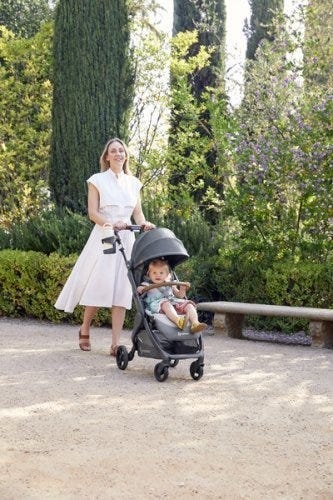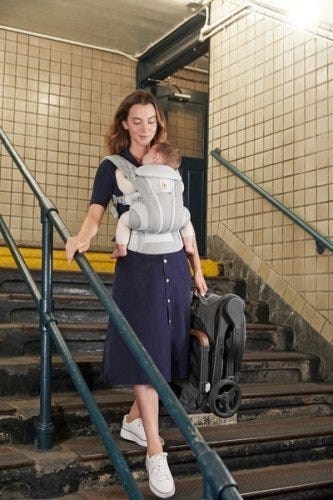“I want my baby to thrive.” Can it be as simple and easy as nature intends? Not every doctor integrates nature’s wisdom in their standard recommendations, so this book can be your supportive guide. Your choices and decisions are restored to their rightful, healthiest place in honoring yourself, your intuition, and your baby’s true needs. This is crucial for giving your family and your baby its best first steps towards thriving. What Your Pediatrician Doesn’t Know Can Hurt Your Child; A More Natural Approach to Parenting takes an in-depth look at the choices that are sometimes missing, as they have been removed in the sterile procedures and interferences of history, habit and some hospitals. Knowing what these choices are and the reasons behind them makes your decisions as a parent more optimally grounded in confidence and facts. Author Pediatrician Dr. Susan Markel points out that too often babies and parents are subject to the opinions of authorities, pseudo-science, and trends that are not in the baby’s or their family’s best interest. She reminds us of the natural strength of bonding at birth and other innately simple practices and healthy patterns you may feel naturally called to embrace. Here is an ally in your unfolding adventure as a new parent, and a professional viewpoint that is at once refreshing and regenerative. From birth to doctor’s visits, you are in charge In What Your Pediatrician Doesn’t Know Can Hurt Your Child, parents learn the variety of issues that are present with the birth of their baby. This preparation has lifelong implications and benefits in bonding, health, and orientation for your baby. Did you know this? “There is absolutely no reason why a healthy baby should be separated from you. Mothers who give birth in a hospital can request that all newborn procedures occur at their bedside…A baby has a need to feel safe and secure through close human contact.” From the moment your baby is born they are best kept in your arms, or with loved ones, comforted by the closeness. Skin-to-skin contact while breast-feeding often is optimal for the many reasons detailed, from remedying jaundice to establishing healthy microflora in the baby’s intestines for a strong immune system. “When infants are breast-fed, lactoferrin brings about a dramatic increase in “good” micro-organisms in the intestine – such as bifidus—and keeps “bad” bacteria to a minimum. One bottle of formula is all it takes to alter the establishment of this healthy bacteria.” Monitor your baby’s intake, as formula and sugar water may be given if you are not clear in your instructions, and your wishes may even be ignored when the baby is out of your sight in the nursery. Did you also consider this? The silence a baby is born into has a profound effect on their wellbeing, allowing them to adjust peacefully. The soft sounds and gentle comfort of being in the womb are normal to a newborn. It makes sense to consider how to make their birth environment soothing, and nurturing, not bright, loud, and shocking. Sound advice: “While your pediatrician is likely competent in issues of illness, injury, and emergency care, he might not be as well-versed in breast-feeding, co-sleeping, natural remedies, and behavioral issues. An enlightened pediatrician knows when to prescribe medicine, and more importantly, when not to.” Something as simple as delaying the clamping of the umbilical cord, can achieve a 40% increase in natural blood volume, including platelets and other clotting factors. The chapter called Maintaining Health begins by quoting Meryl Streep: “It’s bizarre that the produce manager is more important to my children’s health than the pediatrician.” Easy steps to health: enjoy some sun for Vitamin D, avoid cow’s milk at all costs, and listen to your baby’s cues, so you can meet their needs immediately, building a bond of trust and relaxation. There is a root cause to any concern, and health is often reflective of whether or not our core functions and systems are supported optimally. What is optimal can be simple, and often is. Doing nothing is sometimes the most powerful choice, allowing nature to take its course of healing naturally, slowly, and completely. Subtle healing remedies can be more effective and avoid harmful side effects. Holistic natural remedies are compared to medical intervention with their damaging extreme side effects, and these important questions are answered in What Your Pediatrician Doesn’t Know Can Hurt Your Child.
- Just how beneficial is breastfeeding to a child, and to the world?
- What is attachment parenting and how can it help a child and a family?
- Can babies benefit from watching educational television and videos?
- What are the proper ways to respond when a child is having a tantrum?
- What can a vegetarian diet mean for a child’s health?
- How unhealthy is cow’s, and other animals’ milk for a child?
- What do co-sleeping and babywearing do for the mother-child bond?
“A mother’s instincts are worth more than a medical degree.”
Links: Dr. Susan Markel, MD ~ www.AttachmentParentingDoctor.com Dr. Susan Markel, MD is a board certified pediatrician who has a private consultative practice specializing in attachment parenting and child health. A graduate of Tufts University School of Medicine in Boston, Dr. Markel became a fellow of the American Academy of Pediatrics in 1981, and an International Board Certified Lactation Consultant (IBCLC) in 1997. She is also a medical associate at Attachment Parenting International. http://esciencenews.com/articles/2011/11/16/delayed.cord.clamping.protects.newborn.babies.iron.deficiencyDelayed cord clamping protects newborn babies from iron deficiencyPublished: Wednesday, November 16, 2011 - 05:38 in Health & Medicine Waiting for at least three minutes before clamping the umbilical cord in healthy newborns improves their iron levels at four months, according to research published online in the British Medical Journal (bmj.com).
Emotional Benefits of Getting Outside
Spending time in nature with your baby can strengthen the bond between you. The simple act of holding your baby close, feeling their warmth, and sharing new experiences together can create strong emotional connections. It’s also a wonderful way to reduce stress and improve your mood. When my littles were extra fussy, I’d take a walk around the neighborhood. Even though I don't live in an area with trails and surrounded by nature, simply behind outside changed everything. A little vitamin D does wonders!
Cognitive Development
Nature is a sensory wonderland for babies. The different sights, sounds, and smells can stimulate your baby’s senses and promote cognitive development. Watching leaves rustle, hearing birds chirp, and feeling the texture of a tree bark can all contribute to their learning and development.
All About Baby Carriers for Nature Adventures
Choosing the Right Baby Carrier
When it comes to selecting the best baby carrier for summer adventures, there are several options to consider.
Types of Baby Carriers:
- Wraps: Perfect for newborns, providing a snug and secure fit.
- Slings: Ideal for quick and easy use, offering good ventilation.
- Soft Structured Carriers: Versatile and comfortable for both parent and baby, suitable for longer trips.
Factors to Consider:
- Baby’s Age and Weight: Ensure the carrier is appropriate for your baby’s size and weight. For example, Ergobaby’s Embrace Newborn Carrier is perfect for the fourth trimester where baby is small and you’re looking for an easy way to stay close. As they grow, you’ll want to upgrade to an all-position carrier that’s meant for growing babies.
- Parent’s Comfort and Ergonomics: Look for carriers with padded shoulder straps and lumbar support if you’re planning on longer outings.
- Ease of Use: Choose a carrier that is easy to put on and take off.
- Climate and Breathability: Opt for carriers made of breathable fabrics to keep you and your baby cool in hot weather.
Safety Tips:
- Proper Positioning: Ensure your baby is seated correctly, with their legs in an "M" position and their head should be close enough to kiss.
- Checking for Wear and Tear: Regularly inspect your carrier for any signs of damage.
- Ensuring Adequate Support: Make sure the carrier provides proper support for your baby’s head and neck.
Exploring Nature with a Baby Carrier
Ideal Spots for a Nature Walk with Baby
- Parks and Gardens: Great for leisurely walks and picnics.
- Nature Trails and Forests: Perfect for more adventurous outings.
- Beaches and Lakesides: Wonderful for enjoying the water and sand, with the right carrier.
Activity Ideas
- Hiking: Enjoy a scenic hike with a hiking baby carrier that offers support and storage.
- Bird Watching: Use your carrier to keep your baby close while you explore and observe wildlife.
- Picnics: A carrier can free up your hands, making it easier to carry picnic supplies.


Advantages of Using Strollers for Nature Adventures


While baby carriers are fantastic for mobility and closeness, depending on the adventure of choice you might want to be a stroller along too.
There are a LOT of baby stroller options on the market. So we understand how confusing it can be to choose the one that’s right for your family. Not only are there a variety of brands, but a variety of strollers that serve different purposes.
There are a few types of strollers on the market:
- Full-sized stroller: This is typically the stroller parents thing of buying for all its versatility.
- Lightweight or umbrella stroller:These compact strollers are perfect for on-the-go adventures.
- Jogging stroller: Designed for parents who want to combine fitness with outdoor adventures.
- Double stroller: Designed for parents with multiple kids, especially twins.
- Car seat carrier: These strollers connect to a specific car seat. We don't typically recommend these as they can be unsafe for baby and uncomfortable for parents who are pushing.
Learn more about the types of strollers and which one would be best for you.
Benefits of Bringing a Stroller
- Storage Space for Gear: Ample room for carrying all your essentials like a diaper bag, beach toys and more.
- Shade and Weather Protection: Built-in canopies to shield your baby from the sun when they are lounging.
- Options: If you have more than one kid, you can stroll with one and carry the other. Or, if you’re getting warm or your little one is getting fussy, you can switch up their position from stroller to carrier or vice versa.
Safety Tips for Strollers
- Ensure your stroller is in good working condition. Make sure buckles are still buckling and that there are no rips or holes that could compromise your baby’s safety.
- Use sunshades or bug nets to protect your little one’s skin.
- Securing the baby properly: always buckle up your baby for safety even if you think they are old enough to go without the buckle.
Combining Baby Carriers and Strollers
For the ultimate flexibility, consider using both a baby carrier and a stroller on your outings.
Combining both options allows you to adapt to different situations. Use the carrier for more rugged trails and switch to the stroller for smoother paths or when your baby needs a nap.
Transition Tips
- Smooth Transitions: Plan stops where you can easily switch from carrier to stroller.
- Pack Light: Only bring essentials to make transitions easier.
Tips for a Successful Adventure
Planning Ahead
- Route Planning: Choose baby-friendly trails and parks. Check local mom groups or outdoor groups and get recommendations for the best outings for kids.
- Check Weather Conditions: Avoid extreme heat or unpredictable weather. Even with our most breathable carriers, when it’s hot, it’s hot. And having two bodies against each other in the heat will be naturally hot and sticky already.
- Packing Checklist: Include diapers, snacks, water, sunscreen, and a first-aid kit. These all-position carriers have storage pockets where you can fit some of the items easily!
- Stay Hydrated and Nourished: Pack healthy snacks to keep energy levels up and bring plenty of water for both you and baby.


Summer adventures with your baby are a wonderful way to create lasting memories and enjoy the beauty of nature together. From baby carriers to strollers, Ergobaby products are designed to provide comfort and ease for both you and your little one. So, gear up, get outside, and explore the world with your baby by your side.
Ready to embark on your own summer adventures? Check out Ergobaby’s range of baby carriers and strollers to find the perfect match for your family’s needs. Visit our website today and start planning your next outdoor excursion!



























